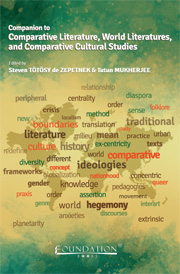Book contents
- Frontmatter
- Contents
- Introduction to the Companion to Comparative Literature, World Literatures, and Comparative Cultural Studies
- PART 1 Theories of Comparative Literature, World Literatures, and Comparative Cultural Studies
- PART 2 Comparative Literature in World Languages
- PART 3 Examples of New Work in Comparative Literature, World Literatures, and Comparative Cultural Studies
- African Literatures and Cultures and the Universal of Motherhood
- World literatures and the Case of Joyce, Rao, and Borges
- Abject Spaces and the Hinterland in Bolaño's Work
- The Motif of Fleeing in Gao's Work
- Arab Fiction and Migration in the Work of Haqqi and Salih
- Sexual Identity and Translation in Prime-Stevenson's Work
- The Notion of Life in the Work of Agamben
- Aesthetics, Opera, and Alterity in Herzog's Work
- An Intermedial Reading of Paley's Sita Sings the Blues
- Painting and Representation in Teaching Balzac
- PART 4 Multilingual Bibliography of Books in Comparative Literature, World Literatures, and Comparative Cultural Studies
- Index
The Motif of Fleeing in Gao's Work
from PART 3 - Examples of New Work in Comparative Literature, World Literatures, and Comparative Cultural Studies
Published online by Cambridge University Press: 05 April 2014
- Frontmatter
- Contents
- Introduction to the Companion to Comparative Literature, World Literatures, and Comparative Cultural Studies
- PART 1 Theories of Comparative Literature, World Literatures, and Comparative Cultural Studies
- PART 2 Comparative Literature in World Languages
- PART 3 Examples of New Work in Comparative Literature, World Literatures, and Comparative Cultural Studies
- African Literatures and Cultures and the Universal of Motherhood
- World literatures and the Case of Joyce, Rao, and Borges
- Abject Spaces and the Hinterland in Bolaño's Work
- The Motif of Fleeing in Gao's Work
- Arab Fiction and Migration in the Work of Haqqi and Salih
- Sexual Identity and Translation in Prime-Stevenson's Work
- The Notion of Life in the Work of Agamben
- Aesthetics, Opera, and Alterity in Herzog's Work
- An Intermedial Reading of Paley's Sita Sings the Blues
- Painting and Representation in Teaching Balzac
- PART 4 Multilingual Bibliography of Books in Comparative Literature, World Literatures, and Comparative Cultural Studies
- Index
Summary
Abstract: In her article “The Motif of Fleeing in Gao's Work” Mabel Lee explores the aesthetic dimensions of fleeing in Xingjian Gao's 1990 play Escape, and how they are manifested in his novels Soul Mountain and One Man's Bible. Lee argues that the intensely emotional times during which Gao wrote Escape were comparable to those seventy years earlier confronting writers of the May Fourth era (1915–1921). Urging his compatriots not to be “bystanders,” Xun Lu, the most influential of May Fourth writers, had chosen to allow his creative self to suicide, as shown in his 1927 prose-poem collection Wild Grass. For Gao, however, such heroic gestures are anathema and his work is a declaration for literature unburdened by politics.
Xingjian Gao (born in China 1940) was proclaimed 2000 Nobel Laureate on the basis of his short stories, eighteen plays, and two novels, a substantial part of which had also been published in French, Swedish, and English. However, following the announcement, self-professed authorities from various parts of the world condemned the award, but curiously, they only mention one or two plays he had written in the early 1980s, so it was obvious that the condemnations were based on political or personal motives not related to Gao's literary achievements. Here, I focus on the aesthetic dimensions of the play Escape and hed light on that controversy, but do not seek to explore it further. Nonetheless my study is prefaced with the statement that such a controversy took place (see Tam, “Gao”).
- Type
- Chapter
- Information
- Companion to Comparative Literature, World Literatures, and Comparative Cultural Studies , pp. 411 - 422Publisher: Foundation BooksPrint publication year: 2014



